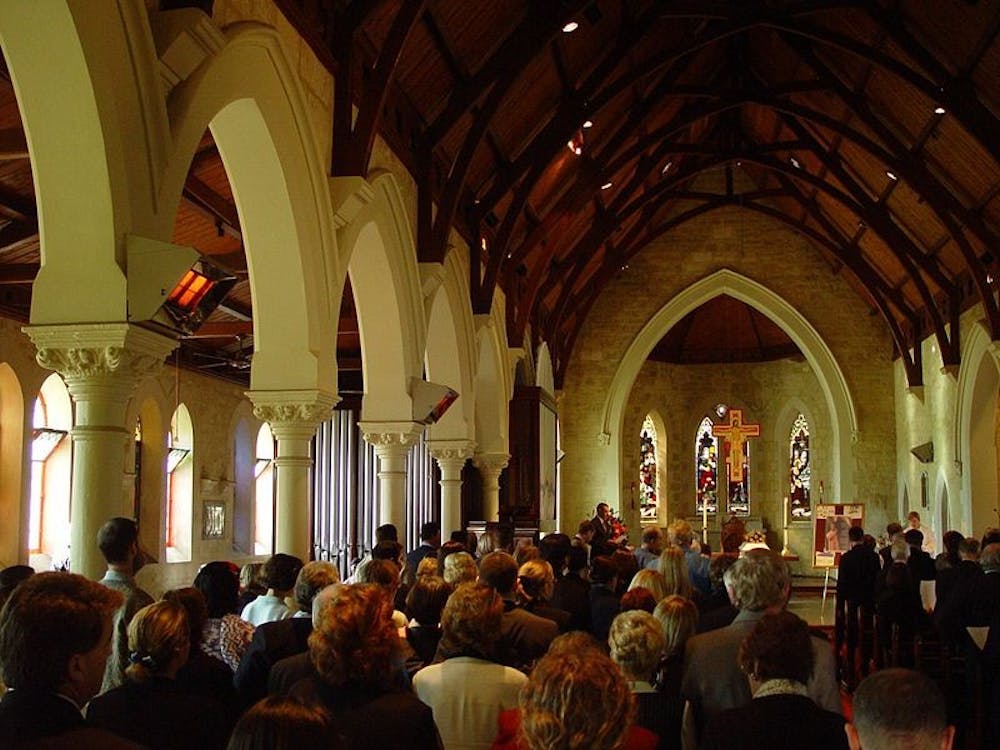The University’s latest update to the SEC-045 policy addressing COVID-19 public health measures does not restrict attendance to places of worship. Those regulations are instead deferred to ordinances from the City of Charlottesville and Albemarle County. Neither ordinance classifies religious ceremonies or attendance as “gatherings,” and are thus not subject to the standard 50 person limit. According to the Centers for Disease Control and Prevention, a gathering of more than 50 people would be classified as a “highest risk” gathering. Nevertheless, the irresponsible policies don’t stop there, as wedding receptions and ceremonies are exempt from gathering limits under the City and County because of their religious connotations.
Everyone is making sacrifices in the face of a global pandemic, such as staying apart from loved ones, and small business owners shutting down their livelihoods due to COVID-19. These dispensations have and will prove lethal across the country if mitigation measures continue to be ignored when religion is considered. Religious groups must also contribute to this shared sacrifice in order to decrease the disease’s spread — it is not too much to ask that they be regulated under standard gathering rules.
The University’s other exemptions for the 15 person limit are reasonable and in accordance with the Return to Grounds Plan, including sporting events, protests and public stores. These are all either outdoors or essential for daily life — meaningful reasons for exemptions. While the University probably won’t have to deal with a gathering of more than 50 people at the University Chapel, they should take a firm stance on mitigation criteria for all gathering limits, instead of singling out and privileging religious gatherings. And what may end up being a nonexistent issue for the University is really emblematic of a larger national issue — deterioration of the separation of church and state.
In accordance with the First Amendment, no places of worship can be forced to adhere to more rigid mandates than mandates of similar services and entities. However, the opposite situation is occurring in Charlottesville and in many communities across the nation. Communities of faith are being placed above public health concerns so they can practice in person, which is simply unnecessary. It is also a breach of the separation of church and state since similarly situated secular gatherings do not enjoy these exemptions. Religious practices should remain online, where they can provide the same quality sermons, community building and worship without risking lives. Churches and other public worship spaces already enjoy privileged treatment from the government, such as automatically granted tax exemption, virtually no oversight or limits on lobbying practices and loopholes that allowed them to receive billions of dollars in COVID-19 funds from the government. It is unconstitutional and deadly for the University, Charlottesville, Albemarle and Virginia as a whole to provide places of worship exemptions from COVID-19 mitigation standards.
By exempting churches and their equivalents from public health regulation, the government is favoring religion over nonreligion, a wholly unconstitutional provision. Churches have already defied government orders and escalated rates of COVID-19 in many states. Communal meetings are exactly that — communal — and these types of gatherings are notably more prone to spreading the disease. The University and Virginia should alter their orders — the actions of just a few could lead to catastrophic health issues. We cannot let these rules remain in place when they actively work against safety recommendations for large groups, endangering the health of non-religious citizens too. Many congregants travel from outside the immediate area, and are potentially contributing to the spread of COVID-19 to different counties. Unrestrictive regulations for churches and their peers do not impede on religious freedom because large in person religious gatherings are not necessary in freely practicing one’s religion. Further, religious expression should not trump the lives of community members in the first place. A global pandemic requires cooperation and respect for one another’s well-being, and no one should be exempt from preventative mitigation measures without reason.
Religious institutions can and should function online for the sake of others. The University community needs to emphasize safety for all, especially with the risky decision to bring back on-Grounds students and push forward with in person classes. The only way we can continue to keep COVID-19 cases at bay is by community cooperation. Exemptions for certain gathering restrictions place undue strain on Charlottesville and undermine the responsibility that places of worship have to their community. Let us emphasize rationality, reason and science — they will save lives.
Nicole Chebili is a Viewpoint Writer for The Cavalier Daily. She can be reached at opinion@cavalierdaily.com.
The opinions expressed in this column are not necessarily those of The Cavalier Daily. Columns represent the views of the authors alone.
Correction: This article was previously accompanied by a photo of St. Paul's Memorial Church at the University, which has not had indoor worship service since March 10 and limits attendance at outdoor services to fifty people with mask and distancing requirements. The photo has been changed to reflect that St. Paul's is not taking advantage of the religious exemption in order to sponsor or host unsafe events. The Cavalier Daily regrets the error.







